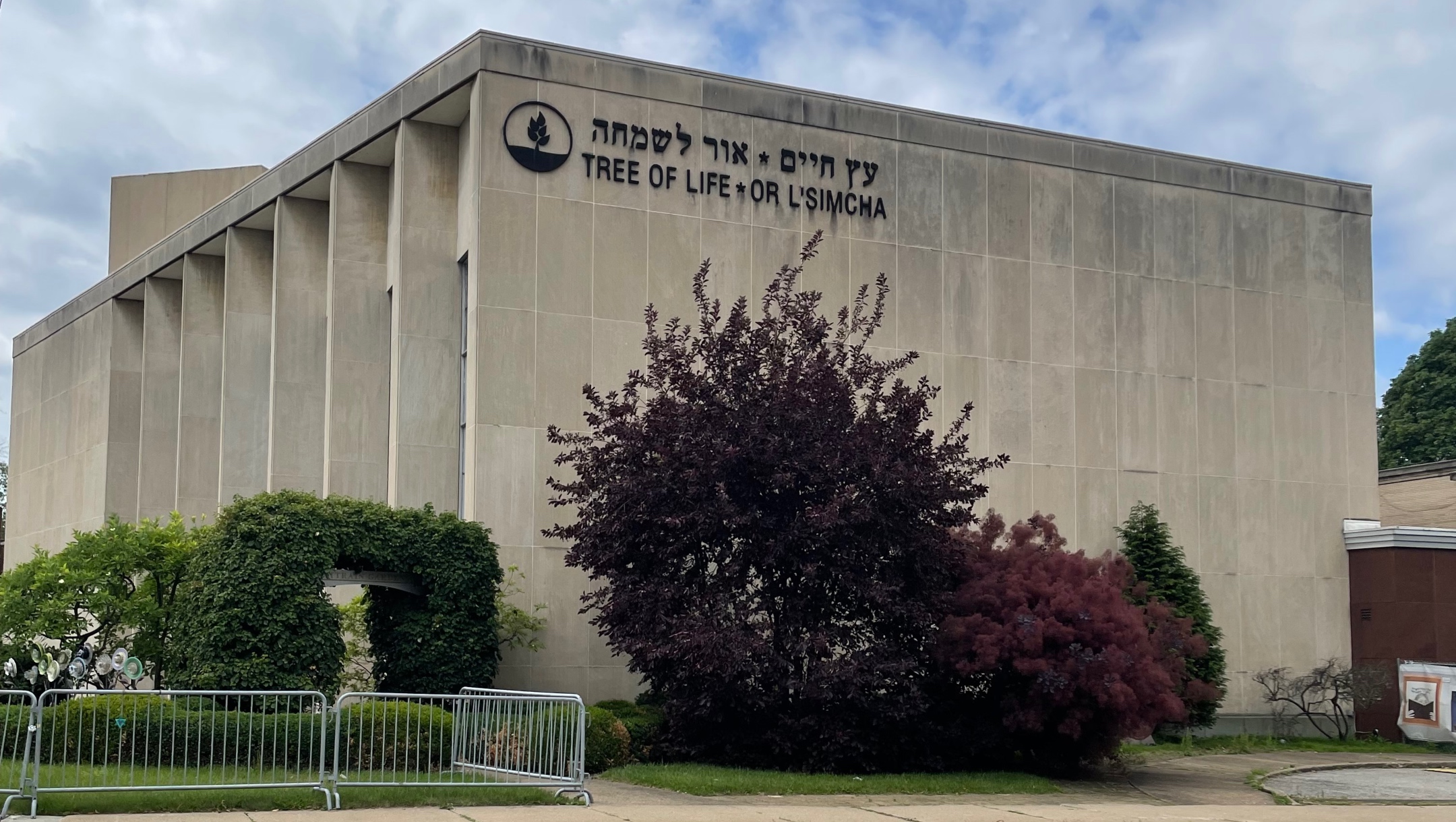Pittsburgh synagogue shooter sentenced to death
Robert Bowers’ sentence makes him the most prominent person to be condemned to death for antisemitic crimes since Adolf Eichmann

The Tree of Life synagogue in Pittsburgh, June 26, 2023. Photo by Ron Kmapeas/JTA
PITTSBURGH (JTA) — A jury has given the Pittsburgh synagogue shooter a death sentence, handing down the maximum punishment for the worst antisemitic attack in American history.
The sentence marks an end to the months-long trial of Robert Bowers, who was convicted in June of murdering 11 Jews during Shabbat prayers on Oct. 27, 2018. The shooting, at a synagogue in the historically Jewish neighborhood of Squirrel Hill, changed the way Jews across the United States viewed themselves and their place in American society. It was a stark example of a rising tide of antisemitism and led Jewish institutions across the country to bolster their physical security.
The gunman’s lawyers had not contested his guilt but argued that the act was a result of his mental illness and did not merit a death sentence. On Wednesday, the jury rejected that argument, deciding unanimously that he should be put to death. Many of the victims’ families, though not all, had pushed for the gunman to receive a death sentence.
Bowers’ sentence makes him the most prominent person to be condemned to death for antisemitic crimes since Adolf Eichmann, convicted and executed by Israel in 1962 for his role in perpetrating the Holocaust.
U.S. District Judge Robert Colville, who has presided over the trial, is bound to honor the jury’s verdict. The jury’s decision, though, does not mark an end to the case, as Bowers, like all people sentenced to death, is entitled to an appeal.
The verdict is a rare failure for Bowers’ lead attorney, Judy Clarke, who has represented some of the most high-profile murderers in recent U.S. history, including Ted Kaczynski, known as the Unabomber; the surviving Boston Marathon bomber; and the white supremacist who opened fire in a Jewish community center outside of Los Angeles in 1999. She had successfully argued in all but one case that the men should spend their lives in prison, not be executed for their crimes.
The family of victim Rose Mallinger thanked the jury, adding in an emailed statement: “We now feel a measure of justice has been served. This sentence is a testament to our justice system and a message to all that this type of heinous act will not be tolerated. Returning a sentence of death is not a decision that comes easy, but we must hold accountable those who wish to commit such terrible acts of antisemitism, hate, and violence.”
The family of Bernice and Sylvan Simon also expressed gratitude to the jury, saying in a statement: “We fully respect their verdict and decisions.”
Jeffrey Myers, the Tree of Life Congregation rabbi who survived the attack, noted that “many of us have been stuck in neutral. It was a challenge to move forward with the looming specter of a murder trial. Now that the trial is nearly over and the jury has recommended a death sentence, it is my hope that we can begin to heal and move forward.”
Stephen Cohen, the co-president of New Light, one of three congregations targeted in the shooting, said in a statement that the death penalty remains a subject of “vigorous debate,” noting that many congregants would have preferred the shooter to spend life in prison. On the other hand, he added, “life in prison without parole would allow the shooter to celebrate his deed for many years.”
The Jewish Federation of Greater Pittsburgh said the trial “shows that our justice system can work by giving a voice to the voiceless and by ensuring that we, as a society, can bring the perpetrator of this horrendous attack to account.”
Bowers killed 11 people who were worshipping at three congregations: Tree of Life, New Light and Dor Hadash. The victims were Joyce Fienberg, Richard Gottfried, Rose Mallinger, Jerry Rabinowitz, Cecil Rosenthal, David Rosenthal, Bernice Simon, Sylvan Simon, Daniel Stein, Melvin Wax and Irving Younger.
Bowers’ trial began on May 30. On June 16, the jury found him guilty of all 63 counts he faced. On July 13, the jury decided that his crimes were eligible for the death penalty.
Alisa Pomerantz-Boro, a hazzan at Congregation Beth-El in Voorhees, New Jersey, and a friend of the Tree of Life’s Rabbi Myers, reacted to Wednesday’s verdict with these words: “Life sentence, death sentence. Let it be over and let there be healing. Amen.”
Since 1988, when the federal death penalty was reintroduced after 16 years during which it was ruled unconstitutional, only 16 federal executions have taken place, all by lethal injection. The vast majority of them — 13 — took place during a short period in the last year of Donald Trump’s presidency. Dylann Roof, the man who murdered nine worshippers in a Black church in Charleston, South Carolina, is on federal death row now.
The man who opened fire at a synagogue in Poway, California, in 2019, killing one person, was sentenced in federal court in 2021 to life plus 30 years in prison.
This article originally appeared on JTA.org and has been updated by Forward staff with additional reaction.
A message from our CEO & publisher Rachel Fishman Feddersen
I hope you appreciated this article. Before you go, I’d like to ask you to please support the Forward’s award-winning, nonprofit journalism during this critical time.
We’ve set a goal to raise $260,000 by December 31. That’s an ambitious goal, but one that will give us the resources we need to invest in the high quality news, opinion, analysis and cultural coverage that isn’t available anywhere else.
If you feel inspired to make an impact, now is the time to give something back. Join us as a member at your most generous level.
— Rachel Fishman Feddersen, Publisher and CEO